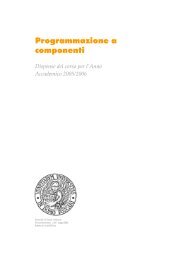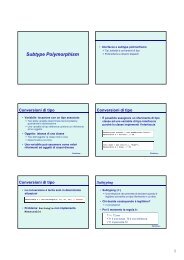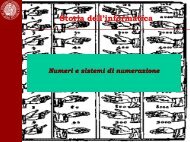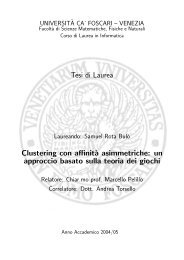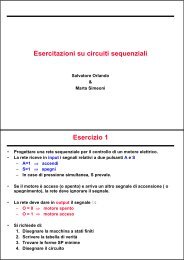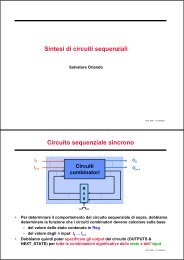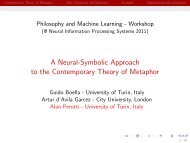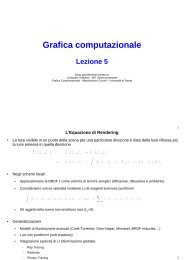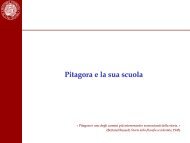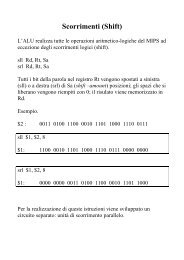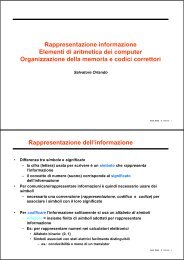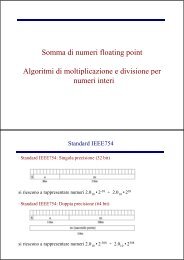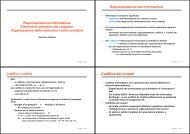Foscari - Dipartimento di Scienze Ambientali, Informatica e Statistica
Foscari - Dipartimento di Scienze Ambientali, Informatica e Statistica
Foscari - Dipartimento di Scienze Ambientali, Informatica e Statistica
You also want an ePaper? Increase the reach of your titles
YUMPU automatically turns print PDFs into web optimized ePapers that Google loves.
Software Patenting<br />
(article supplied by Stefano Calzavara, student <strong>Informatica</strong> 2004/05)<br />
One of the main arguments against software patents in Europe is that they will stifle innovation,<br />
especially for free software developers and Small Me<strong>di</strong>um Size Enterprises (SMEs). Though there<br />
hasn't yet been a concerted attack against free software using patents, there have been many attacks on<br />
SMEs. If any big business needs to remove competition and is failing to do this by beating them on<br />
price, quality, or free licensing, then they can simply attack them with their patent portfolio. Even more<br />
worrying are the so-called "patent trolls" like Acacia Technologies , which "develops, acquires, and<br />
licenses" patented technologies, using them to extract licensing fees out of software developers, but<br />
who do not actually produce any software. The company is opening an office in Europe in the spring<br />
with the intention of deman<strong>di</strong>ng royalties on patents.<br />
Since software, especially free software, is usually based upon a huge number of sub-programmes and<br />
ideas taken from other programmes, it would be extremely <strong>di</strong>fficult to avoid patent infringement.<br />
However, under the U.S. system, SMEs have been restricted due to large companies buil<strong>di</strong>ng up patent<br />
portfolios that they use to reap billions in licensing revenues from other businesses. The idea of selling<br />
products over the Internet has already been patented in the U.S., and Amazon used its "one-click<br />
buying" patent to famously sue Barnes & Noble in the late 1990s.<br />
Examples of currently granted European Patents are EP803105and EP738446<br />
These patent the idea of selling objects over a network using a server, client, and payment processor, or<br />
using a client and a server. In other words, these are patents on selling products over the Internet;<br />
clearly a lot of software would infringe on these overzealous patents. The time and money spent on<br />
patent filing, prosecution, maintenance, litigation, and licensing (which SMEs cannot afford, and which<br />
have caused many to fold or be bought out) could be better spent on product development and research<br />
lea<strong>di</strong>ng to more innovation. Surely, software companies would prefer to live with the pressure of<br />
having to improve and innovate constantly instead of having to deal with software patents? This is how<br />
it works under copyright, which already prevents competitors from merely copying software. This is<br />
also how it has worked up till now, and we have managed to develop the Internet, operating systems,<br />
and other software without patents.<br />
For the free software community, which eschews patents both on pragmatic and ethical grounds, they<br />
represent an even more worrying threat. Gestures from companies like IBM won't ever fully protect us<br />
from attacks. Free software can only guarantee its safety in an environment without patents, in which<br />
the only other threat is copyright infringement, which is easy to avoid--just don't copy proprietary code.<br />
True or False<br />
1 The author of this article believes that software patenting will create more innovation.<br />
2 Big business wants to compete with SMEs by attacking them with patent litigation suits.<br />
3 Accacia Technology, is opening an office in Asia during the summer.<br />
54



